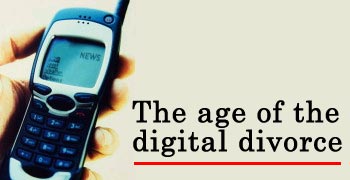
Welcome to the era of SMS and digital divorces. A triple talaq -- via SMS or e-mail. Shocking, impersonal and near instantaneous, that's digital divorce for you.
Recently, Afsana Mushtaq (name changed) in Delhi became the first Indian woman to be digitally divorced when her husband e-mailed her the triple talaq.
Triple talaq is one of the Islamic ways of divorcing a wife by proclaiming the word talaq (divorce) three times.
According to Asghar Ali Engineer of the Centre for Study of Society and Secularism in Mumbai, Shias and all their sects do not accept the triple talaq.
As technology develops, it poses new challenges to traditional practices. While cell phones have become lifesavers in emergency situations, they have also played a crucial role in man-woman relationships. If it has played the role of cupid, it is also posing a challenge to traditional matrimonial practices.
In the UAE and in Malaysia, cell phones have been used to end marriages by SMS-ing 'Talaq, talaq, talaq.' But then, this is not the first time technology has been used to officially terminate a relationship. Earlier, it was telephonic, postal and telegram divorces; now there are talaqs via e-mail and SMS.
Technology has changed the way people are courting, getting married and, yes, also the way they are separating. "If people are meeting and dating on the Internet, why can't divorces take place as well?" asks Anuradha Pratap, principal of the Al-Ameen Management College in Bangalore.
"If nikahs [weddings] can take place using technology, why not talaqs?" asks Ayesha Banu, a Bangalore resident. "There were telephone weddings nearly two decades ago. It's only the technology that has changed, everything else has remained the same."
Even religious leaders of the concerned community do not see any problem in using new technology to declare talaq. They believe that declaring divorce through SMS has the same effect as a letter -- the same goes for declarations made via the telephone or e-mail, but the divorce would have to be confirmed by a Sharia court with both spouses present.
According to Bangalore advocate Nazeer Ahmed, technology should be treated as just that -- 'a way of communication.' But it is mandatory for the man who is communicating the message to give his proper contact address, without which the procedure is incomplete. Meanwhile, the woman who has received the triple talaq gets three months to respond -- iddat -- during which she can claim maintenance.
Would SMS divorce be considered legal in India? Ahmed says it doesn't matter to which country you belong to, and whether the man is using a telephone, e-mail or a mobile phone to communicate the message of divorce. The Sharia treats technology as a medium of communication and, once the message is communicated and authenticated, it becomes legal under the Sharia. The method of authentication requires witnesses to be present during the divorce procedure. The witnesses may be a male relative or two female relatives.
M A Ataulla, an organisational psychologist, cautions against using new technology to terminate marriages: "As far as possible, chances should be given for other means of communication, since it is easy to misuse modern gadgets."
But Maulana M D Zafeer Alaam Nadvi of Bangalore is not worried about misuse because "only after proper investigation is made and only after the woman confirms that the message was indeed sent by her husband can the divorce take place."
In the UAE, the Emirates of Dubai and Kuwait are in favour of using technology to terminate a marriage. The world's first divorce on a mobile phone took place when a man in Dubai divorced his 26-year-old wife. Of course, this method of ending a marriages holds good only under the Sharia, the Islamic law.
A woman in Malaysia contested the validity of declaring divorce through SMS. According to the Sharia, it is possible to obtain a divorce based on written text, but the concern here is not so much the technology but the way it is used. The wrong guys might use this to get quick e-divorces and it is the women who will have to bear the brunt.
A Malaysian newspaper reported Hamid Othman, adviser to Malaysian Prime Minister Mahathir Mohamad, saying that although Islamic law might permit the use of SMS for divorce, the government would not accept it. 'We have adequate laws to curb rash moves by Muslim men to divorce their wives without justification,' he said.
Image: Rahil Shaikh





